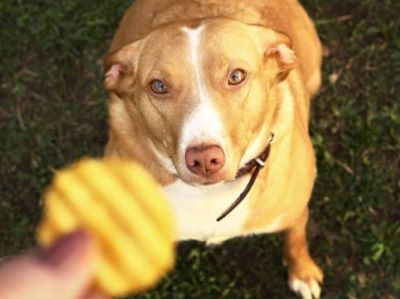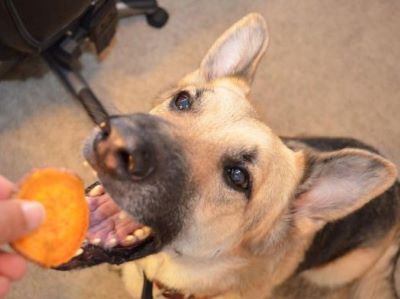One of the most favored snacks worldwide is potato chips. There are many different flavors and shapes available, and they are crispy, salty, and filling.
The act of snacking on chips while engaging in television viewing, gaming, or socializing with friends is popular. Then again, what about our furry friends? Can dogs eat chips? Is it safe?

We’ll discuss the benefits and drawbacks of giving chips to dogs in this post, as well as responsible and safe feeding practices.
Can Dogs Eat Chips? Dangers of Feeding Chips
While chips may seem like a harmless and tasty treat for your dog, they can actually pose several health risks for your furry friend. Here are some of the dangers of giving chips to dogs:
1). Obesity and Related Diseases
This section explains how chips can make your dog overweight and how obesity can affect your dog’s health:
a). Chips can make your dog overweight: Chips are high in fat, salt, and calories, which can contribute to weight gain and obesity in dogs.[1]
b). Obesity can affect your dog’s health: Obesity can lead to various health problems in dogs, such as diabetes, arthritis, heart disease, and cancer.

2). Dehydration and Kidney Problems
This section explains how chips can dehydrate your dog and how dehydration can damage your dog’s kidneys:
a). Chips can dehydrate your dog: Chips are high in salt, which can cause dehydration and loss of fluids in dogs.
b). Dehydration can damage your dog’s kidneys: Dehydration can affect your dog’s kidneys, which are responsible for filtering waste and toxins from the blood.[2]
3). Harmful Ingredients and Additives
This section explains how some chips may contain harmful ingredients and additives that can cause digestive upset, anemia, or toxicity in dogs:
a). Onion and garlic can poison your dog: Onion and garlic are toxic to dogs and can damage their red blood cells, leading to anemia.
b). Artificial flavors and colors can irritate your dog’s stomach: artificial flavors and colors can cause allergic reactions or stomach irritation in some dogs.
4). Choking Hazard and Dental Damage
This section explains how chips can pose a choking hazard or damage the teeth and gums of your dog:

a). Chips can choke your dog: Chips are hard and crunchy, which can make them difficult to chew or swallow for some dogs. It also describes how chips can break into sharp pieces that can get stuck in your dog’s throat or damage their mouth.
b). Chips can harm your dog’s teeth: Chips can contribute to dental plaque and tartar buildup, which can lead to bad breath, gum disease, and tooth decay in dogs.
Benefits: Dogs Eat Chips
While chips are not recommended for dogs, they may have some benefits if given in moderation and with caution. Here are some of the advantages of feeding chips to dogs:
1). Provide Carbohydrates and Fiber
This section explains how chips can provide some carbohydrates and fiber for dogs[3], which can support their energy and digestion:
a). Carbohydrates can fuel your dog’s brain and muscles: Carbohydrates are a source of glucose, which is the main fuel for the brain and muscles.

It also explains that dogs do not have a specific requirement for carbohydrates in their diet, and that too much carbohydrates can cause digestive problems.
b). Fiber can regulate your dog’s bowel movements and gut health: Fiber can help regulate bowel movements and prevent constipation or diarrhea.
It also explains that fiber can feed the beneficial bacteria in the gut, which can improve immune function and overall health.
It also explains that dogs do not have a specific requirement for fiber in their diet, and that they can get it from other sources such as fruits, vegetables, or grains.
2). Occasional Treat or Reward
This section explains how chips can be used as an occasional treat or reward for dogs, as long as they are plain and unsalted:
a). Chips can make your dog happy and reinforce positive behavior: Chips can make your dog happy and reinforce positive behavior. It also explains that chips should not be given too often or too much, as they can cause weight gain and health issues.
b). Chips can be a way to bond with your dog and show them affection: Chips can be a way to bond with your dog and show them affection. It also explains that chips should not be used as a substitute for a balanced and complete diet.
It also explains that chips should only make up 10% or less of your dog’s daily calorie intake.

3). Stimulate Chewing Instinct and Curiosity
This section explains how chips can help stimulate the chewing instinct and satisfy the curiosity of dogs:
a). Chewing can help relieve stress, boredom, or anxiety in dogs: Chewing can help relieve stress, boredom, or anxiety in dogs. It also explains that chewing can keep their teeth and gums healthy by removing plaque and tartar.[4]
b). Curiosity can help keep your dog mentally stimulated and interested in their environment: Curiosity can help keep your dog mentally stimulated and interested in their environment.
It also explains that chips are not the best choice for chewing or exploring, as they can pose a choking hazard or damage the teeth and gums of dogs.
It also suggests safer and healthier alternatives for chewing or curiosity, such as dental chews, rawhide, toys, or puzzles.
FAQs
Can dogs eat 1 chip?
Although dogs can have the occasional chip, it’s not recommended due to high fat, salt, calories, lack of nutrition, potential harmful additives, choking hazard, and dental damage. Explore safer snack options for dogs.
What happens if my dog eats chips?
Dogs eating chips can suffer from stomach issues, dehydration, obesity, kidney problems, anemia, and toxicity. Choking, dental harm, and distress are also risks. Vet consultation is advised for any signs of distress.
Can dogs eat Lay’s chips?
It is not recommended for dogs to consume Lay’s chips or any other brand of chips. They are high in fat, salt, and calories, contain artificial flavors and colors, and can pose health risks. Safer snack alternatives should be considered for dogs.
Can dogs eat fries?
It is not advisable for dogs to consume fries or any fried potato. High in fat, salt, and calories, lacking nutrition, and posing choking hazards, dogs should opt for safer snack alternatives.
Conclusion
In conclusion of can dogs eat chips, while chips may seem tempting as a snack for your furry companion, it’s important to prioritize their health and well-being.
It’s not a good idea to share salty foods like chips or pretzels with your dog. Eating too much salt can make your dog seriously thirsty. That means a lot of trips to the fire hydrant and it could lead to sodium ion poisoning.
“Transitioning to healthier alternatives is key.” By incorporating fruits, vegetables, or dog biscuits into their diet, you can provide them with nutritious options that won’t compromise their health.
Remember to consult your veterinarian before introducing new snacks. Together, we can ensure our beloved dogs stay happy, healthy, and content.
Share your tips and experiences in the comments below to inspire and support fellow pet owners on their journey. Let’s create a community dedicated to our dogs’ vitality and happiness!
“Don’t let your dog chip away at their health. Choose snacks that are good for them.”
References:
- Sandra C. Mitchell, DVM, DABVP. (2023). Can Dogs Eat Salt? – PetMD
- Reisen, J. (2021). Warning Signs of Dehydration in Dogs. American Kennel Club. – AKC
- Dacvim, C. R. H. V. M. (2022, March 16). Carb Confusion Part 1: The Role of Carbohydrate in Pet Foods. Clinical Nutrition Service at Cummings School. Retrieved June 24, 2023, from – Vet Nutrition
- Gerstner, G. E., Cooper, M., & Helvie, P. (2010). Chewing rates among domestic dog breeds. The Journal of Experimental Biology, 213(13), 2266–2272. – JEB

Julia is a Board Certified Veterinary Nutritionist, practicing veterinarian in a non-profit animal hospital and feline sanctuary located in Rochester, NY. She is also a full-time veterinary advisor at DogLikesBest. She focuses on writing healthcare-related topics including dog foods, treats, veterinary diets, food for specific healthcare features, etc. Moreover, any article on DogNeedsBest that has to concern feline health in any way, goes under her scrutiny before being published.

